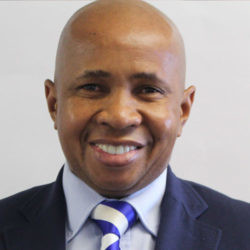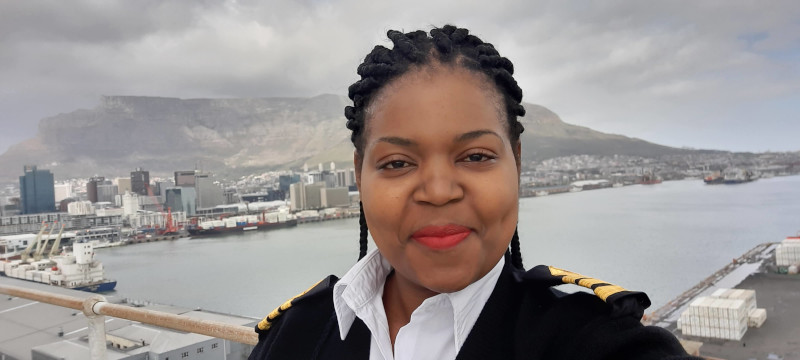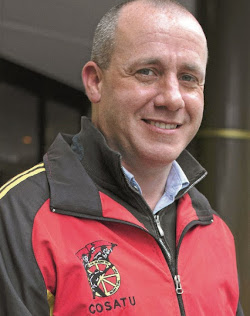Forging links: Ayanda Holo, Government Communication and Information System (GCIS) Director of International Media Relations.
It has been over a decade since the AU signed the 2050 Africa’s Integrated Maritime strategy (2050 AIM) to strengthen the continent’s regional and international partnerships and advance individual countries’ economic well-being. Have the 2050 AIM objectives, such as promoting African vessel ownership, been achieved?
The Government Communication and Information System (GCIS) in partnership with Mail & Guardian hosted a webinar on 31 October to report on the progress that has been made in the maritime sector over the past 10 years.
Moderator Ayanda Holo, GCIS Director of International Media Relations, opened the proceedings by stating that South Africa has almost 3 000km of coastline that provides an exclusive economic zone, making the maritime industry a critical vein of the country’s economy. Up to 90% of our trade is sea-borne, but challenges were holding the country and continent back from developing the industry.
Holo introduced the speakers who would address the state of the maritime industry, opportunities and challenges faced by various sectors, funding and financial partners, how to encourage youth and women into the sector and, lastly, labour issues for workers at sea.
State of the maritime industry
Holo asked Vusi September, Executive of Corporate Affairs for the South African Maritime Safety Authority (SAMSA), to provide an overview of the industry. “Despite a notable growth rate, accelerated by the intensification of trade relations with the Asian continent in particular, Africa’s share represents about 3% of the world’s share of international freight transport, about 5% of world trade, less than 3% share of global seafaring community and less than 3% of the world’s container traffic,” September said.
Key concerns highlighted by the AU leading up to the adoption of 2050 AIMS included:
- Africa representing less than 0.9% of global gross tonnage.
- Huge financial losses due to illegal, unreported, unregulated (IUU) fishing.
- Dumping of toxic waste.
- Environmental crimes such as oil spills.
- Illegal bunkering.
- Piracy and armed robbery in eastern and western Africa; terrorism; human, wildlife and drug trafficking.
- Climate change.
September said the objectives of 2050 AIMS are: “Establishing a combined exclusive maritime zone of Africa, engage civil society and all other stakeholders to improve awareness on maritime issues, enhance wealth creation and regional and international trade performance.”
 Vusi September, Executive of Corporate Affairs for the South African Maritime Safety Authority (SAMSA).
Vusi September, Executive of Corporate Affairs for the South African Maritime Safety Authority (SAMSA).
He emphasised the importance of the Blue Economy, referring to maximising the economic benefit presented by the ocean while preserving it. By 2050, it is projected that Africa’s population will triple in size with 60% being below the age of 34. The maritime industry needs to be developed to cater for this population group. September added that Africa has an established maritime governance framework including the UN Convention on the Law of the Sea, AU, African Maritime Charter and Plan of Action, regional economic communities, SADC protocol and various memoranda of understanding.
A key 2050 AIM objective is to promote and grow the African ship register, so tax and non-tax incentives must be established to build the register and domestic ship ownership market. September said support for the local registry of vessels could be gained through incentives and the encouragement to use SA-flagged ships for cargo and coastal operations.
“South Africa’s primary motivations for developing its maritime industry are: employment creation, domestic involvement in import and export supply chains, expansion of the shipping register and investment and development in industries that are peripheral to ship ownership and operation, such as insurance and maritime law,” said September.
Finding financial partners
Holo pointed out that the “one thing you need the most for growth in the sector is funding”, and asked Joy Balepile, Head of Automotive & Transport Equipment for the Industrial Development Corporation (IDC), to talk about the scope of the maritime industry.
 Joy Balepile, Head of Automotive & Transport Equipment for the Industrial Development Corporation (IDC).
Joy Balepile, Head of Automotive & Transport Equipment for the Industrial Development Corporation (IDC).
“South Africa is positioned along one of the world’s busiest shipping routes and has eight commercial ports and 44 non-commercial harbours,” Balepile said.
Some of the challenges in the industry include: cyclical build and fluctuating demand, small in size with a limited number of players, heavily reliant on imported components, need for long-term funding, high capital investment requirements, limited transformation, insufficient dry-dock and repair facilities, dependence on port infrastructure and equipment, declining numbers of ships calling to South African ports, and a lack of local component manufacturers.
Balepile outlined some of the marine manufacturing subsector opportunities:
- Building and repairing watercraft of various classes.
- Drilling platforms, barges, pontoons and other floating or submersible structures.
- Marine components and equipment.
- Marketing, sales and distribution of vessels and equipment.
However, the commercial market for vessel construction and repairs has been progressively declining since the 1990s. Shipbuilders are dealing primarily in domestic and regional markets where business is sourced from government contracts, the offshore fishing industry, the commercial diving sector and offshore natural gas and diamond-mining industries.
South Africa is a small player in the world market, which is dominated by Asian countries, and accounts for around only 1% of the global ship repair and refurbishment market.
“The IDC approved a facility for participation in a bankable feasibility study and preparation of a shareholders agreement in support of the establishment of a new Green Ship Recycling Facility at Saldanha Bay in the Western Cape,” Balepile said. This environment-friendly facility is expected to create vast employment opportunities, especially among the youth.
Strategic stakeholder engagements
Holo said a role model of a young person taking on the leadership mantle in the maritime sector is Transnet National Ports Authority (TNPA) Deputy Harbour Master at the Port of Cape Town, Captain Thokozani Mthethwa. He asked her to outline the TNPA’s role in the industry’s transformation and to describe the opportunities that are available to improve intra-trade in Africa.
 Captain Thokozani Mthethwa, Transnet National Ports Authority (TNPA) Deputy Harbour Master at Port of Cape Town.
Captain Thokozani Mthethwa, Transnet National Ports Authority (TNPA) Deputy Harbour Master at Port of Cape Town.
She said that at TNPA they “believe in the concept of ‘co-opetition’ — collaborate where we can compete if we must”. Co-opetion is one of the ways the continent can reach the 2050 AIM objective of “Think Africa above all”.
Mthethwa said South Africa’s eight ports vary in services and systems. “Each port has its own Master Plans and Port Development Framework Plans to adequately respond to and plan for future growth. These plans guide how capacity will be increased over the short to long term to respond to the anticipated demand,” she said.
The TNPA is involved in integrated strategic customer and stakeholder engagements as well as operating world-class ship repair facilities. Mthethwa said Transnet’s mandate is to assist in lowering the cost of doing business in South Africa, and “ensuring the security of supply by providing appropriate port, rail and pipelines in the most cost-effective and efficient manner”.
The authority offers various opportunities for African youth, women and businesses through SMME workshops, business-to-business engagement sessions, career exhibitions in collaboration with the department of education, port tours, corporate social investment programmes and bursaries — of which Mthethwa was a recipient.
 Matthew Parks, Cosatu Parliamentary Coordinator
Matthew Parks, Cosatu Parliamentary Coordinator
Workers’ rights at sea
The crucial participants in any industry are the workers, Holo said, introducing the final speaker on the panel, Matthew Parks, Cosatu Parliamentary Coordinator. Parks pointed out the challenges of enforcing laws at sea which have led to the “wholesale defiance of labour laws by some maritime employers”. It is also difficult for workers to become unionised.
Some of the abuses experienced in the sector are the exploitation of migrant workers and the absence of access to health facilities as well as unpaid workers being frequently abandoned at ports.
Serious levels of criminality also hamper working conditions, he said, listing cable theft, corruption and customs fraud, rampant poaching by gangs and the law enforcement organs’ lack of capacity to deal with these widescale problems.
To conclude, Parks listed what is to be done to improve conditions for maritime workers:
- Unions need to expand their footprint.
- Establish collective bargaining fora.
- Tighten laws such as the 2020 Merchant Shipping Bill.
- Expand labour and health inspectors.
- Support fishing communities.
- Tackle criminality and poaching.
- Tighten business liquidation laws.
- Require labour laws compliance in Africa Continental Free Trade Agreement to receive fishing quotas, licences and state tenders.
The webinar ended on a positive note with Holo saying that “protecting our oceans is everyone’s business” and it starts with finding sustainable strategies, as presented in the webinar, to boost Africa’s participation in the global maritime industry.
